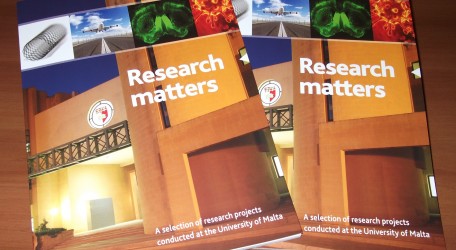
Latest developments in Maltese research
The University of Malta launched the inaugural issue of Research Matters, a bi-annual magazine focusing on sharing news about the latest developments in research activity at Malta’s Alma Mater. The publication has been conceived as part of the University’s planned initiative to explain in layman’s terms the contribution of the University’s research to Malta in order to raise public awareness about the research aspect of the University.
The first issue of Research Matters disseminates information about 13 research projects being undertaken by the University. Some of these projects are also of particular interest to industry as they have developed technologies that can be applied with lower costs than their alternatives. Others can significantly contribute to the saving of lives in Malta and elsewhere.
They include a ground breaking insight on the genetic mechanisms regulating and controlling hemoglobin switching, new materials that behave counterintuitively in life-saving stents, the engineering of intelligent molecules intended for medical diagnostics, the regeneration of dead neurons after brain injury, new surgical tools to enhance keyhole surgery, the latter including the development of a prototype incorporating scissors, grasper and hook in one tool.
Apart from medical developments, the publication provides information about other projects such as the understanding of oceanic and seismic activity around Malta, high frequency radars to detect oil spills and other threats at sea, and studies of trawl fishing samples to understand and monitor the feeding and stock trends around Malta.
The University is also involved in the development of systems for solar desalination of water in Mediterranean conditions, and of onboard control systems to improve runway safety during take-off and landing avoiding serious aircraft incidents using electronic systems designs.
“This publication is just an initial snapshot of the array of research projects being conducted at our University. We want to change the generalising perception that the University of Malta is predominantly engaged in teaching. This publication opens a window on some of the exciting research activity that takes place on our campus, and shows how this research is of benefit to the Maltese community and beyond,” said University Rector, Professor Juanito Camilleri.
Research Matters shows that highly complex studies being conducted at the University of Malta lead to very practical applications and solutions. For instance, the creation of a radically innovative ultra high speed, multi-vision 3D camera offers a technology that can be applied, among other uses, to detect driver vigilance and thus avoids collisions and injuries to pedestrians.
Another research project that can change our quality of life is the development of a single mathematical theory that can lead to new cheaper mobile phones, or to the security testing of a credit card number when transmitted over the internet, or even to conduct an operation without surgery.
A further research study shows how ICT helps keeping a vulnerable language, like Maltese, alive and relevant through digital tools that have been created by the University to appreciate and maintain the value of our Maltese language for future use by empowering its users with highly modern linguistic tools.
There is an urgent need for Malta to give more importance to research and to encourage graduates to remain in Malta, contributing to the economy and the community. In a Eurobarometer survey published last year, Malta emerged as performing below EU average in innovation, with one of its main weaknesses being low levels of public and private investment in research and development. Apart from preparing graduates, the purpose of the University is also to carry out research that benefited society.
In order to face this challenge, a few months ago, the University established the Research, Innovation and Development Trust with an initial capital of €500,000 invested by the government. As it has no assets or reserves of its own, the University is wholly dependent on government contributions to finance its operations. In recent years, the University managed to start decreasing this dependency by generating around 15 per cent of its income, mostly from fees paid by foreign students.
The Trust Fund will help the University to attract private donations to be used primarily for research purposes. Individuals and companies are being asked to donate money to the Trust Fund either by earmarking their donations for specific projects, or allowing the Board of Trustees to manage the funds. Such donations to the fund will be tax deductible.
For more information about the Research, Innovation and Development Trust Fund one may contact Mr Wilfred Kenely at wilfred.kenely @um.edu.mt.
- January 17, 2012 No comments Posted in: Education




